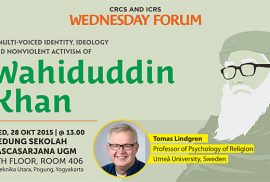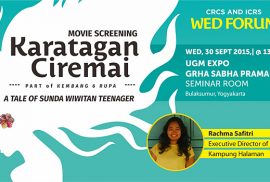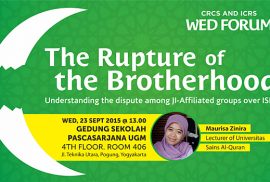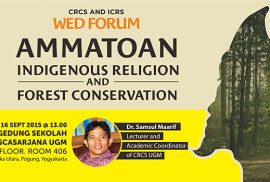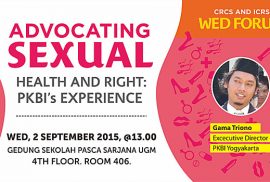Wednesday Forum

Abstract
The return of capital invites the return of marxism. As a set of epistemological and theoretical tools for understanding capitalism and changing it, Marxism suffers from lack of adequate presentation amid the Indonesian academia and is often discredited as obstinately “ideological”, “dogmatic” or simply “utopian”. On the other hand, suspicion over Marxism and its emancipatory practice is widespread among religious discourses. Indeed, Marxism is often understood as the antithesis of religion. Should Islam renounce Marxism and embrace the “truth” of Capital while letting itself be corrupted by Capital? Could Marxism be a viable way of restoring the liberating messages of Islam?

Abstract
Sunda Wiwitan is an indigenous religion of that is practiced by some Sundanese people in Cigugur, Kuningan, West Java. Although the state recognizes this spiritual practice as an aliran kepercayaan, or a recognized belief organization, this community still faces discrimination for practicing their ancestral religion both from the state and from members of the religious majority in their surrounding social environment.
This fifteen-minute documentary tells the story of Anih, a 14 year old Sunda Wiwitan girl, and how she faces the challenges of the societal reactions to being part of a family of Sunda Wiwitan followers.
Karatagan Ciremai is of one of six documentaries of the Kembang 6 Rupa series, a collaborative documentary project voicing girls’ points of view from six areas in Indonesia: Kuningan, Indramayu, Sleman, Sumedang, Sumbawa and Wamena.

Abstract
The presentation attempts to demonstrate that jihadism is not monolithic. In addition, it aims to obliterate generalizing assumption that entire Indonesian jihadists support ISIS. In the Jemaah Islamiyah body—the biggest militant network in Southeast Asia—for instance, subdivision of its sympathizers is becoming more evident. The dispute is strikingly public after fierce debates over support for the Islamic State of Iraq and Syria (ISIS). Majelis Mujahidin Indonesia (MMI) and Jemaah Anshar al-Tauhid (JAT)—the splinter cells of the Jemaah Islamiyah—hold contrasting perspectives on the Islamic State. The former refuses to pledge allegiances with ISIS, arguing that the caliphate is invalid, while the latter sees it as legitimate, requiring all its members to render support for the Islamic State. This dispute evidently indicates fragmentation in the Jemaah Islamiyah body in ideology, strategy and political goal. This presentation will explore such disintegration and its effects to Indonesian Jihadists’ future political struggle.
Speaker
Maurisa Zinira is the Lecturer of Universitas Sains of Al-Quran and UIN Walisongo Semarang. After completing master degree of religious studies from Center of Religion and Cross-Cultural Studies (CRCS) Universitas Gadjah Mada, Zinira continue his master degree in Department of Religious Studies, Florida International University where she achieves outstanding student achievement.

Abstract
Ammatoans of Sulawesi in the eastern part of Indonesia hold religious ideas of social actors that extend beyond human beings. Perceiving both human and non-human beings as equal and constitues inter subjective relationships, Ammatoans’ everyday behaviors and practices is set in this religious perception, including forest conservation. The forest, as vital part of Ammatoans’ life, is conserved by sets of regulations and punishment that restrictly enforced. This presentation will explores how the ideas and practices of Ammatoans’ forest conservation illustrate what scholars have called “religious ecology”.
Speaker
Dr. Samsul Maarif is the Secretary and Academic Coordinator of the Center for Religious and Cross-cultural Studies (CRCS), Graduate School of Universitas Gadjah Mada, Yogyakarta, Indonesia. Achieving Ph.D from Arizona State University, Temple, in Religious Studies and holding two master degree from Florida International University and Universitas Gadjah Mada; both on religious studies, Maarif has long experiences and intensive studies of indigineous religion, especially Ammatoan community.

